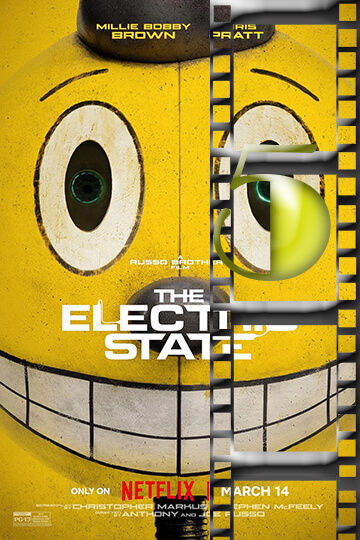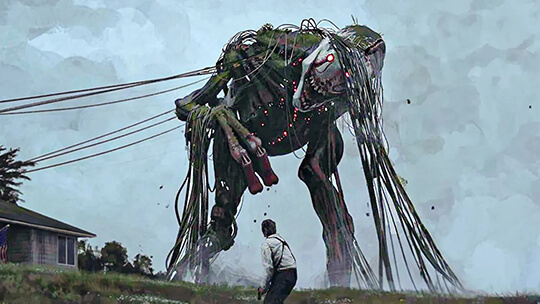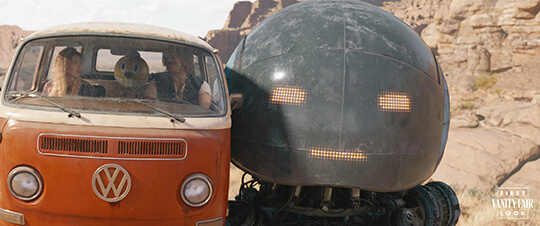

What’s It About
Based on the graphic novel of the same name by Simon Stålenhag, the story takes place in a reimagined version of 1997. With humans isolated in their VR helmets and a continuing battle against a strange breed of monstruous drones in the wake of a technological meltdown, a teenage girl named Michelle and a robot travel the West Coast of the U.S in search of the girl’s missing brother.



MOVIESinMO REVIEW
The Russo brothers have thrown caution to the wind to give the world another flourish, this time in “The Electric State,” a cinematically sumptuous Netflix original sci-fi movie that is splendidly endowed with visual effects. Set in an alternate 1990s America after a devastating robot war, the movie deals with the dangers of technology and the need for human connection but still finds it hard to land its full impact. We meet Michelle (Millie Bobby Brown), who lost her family when she was young and grew up in a world where robots have been sent out of America. Ethan Skate (Stanley Tucci), a tech mogul controlling the land, has given out VR helmet devices, dubbed “telecasters,” to all after their help was sent away. Enter Cosmo, a robot that breaks into Michelle’s room, claiming to be inhabited by the spirit of her brother Christopher. She sets off to look for him in the company of Keats (Chris Pratt) and his robot buddy Herman (voiced by Anthony Mackie) for comic relief as they travel toward the wall separating humans from robots. This allows the film to cleverly mirror our own world’s problems. We see how the war creates division with humans looking down on robots, like when a business owner says, “They deserve the right to work for me when I plug them in,” when dismissing their request for basic rights. It also comments on our obsession with social media, showing humans in a sort of trance while using Skate’s telecasters. Disagreeing, the Russos show that technology can coexist with humankind as long as it is not abused by creators, unlike most tech-related tales that claim “all technology is bad.” This balanced approach seems refreshing and pertinent to today’s world. The cast gives commendable performances throughout. Brown is another interesting protagonist once again, effortlessly shifting from seeming vulnerable to determined. Pratt, Tucci, and the others deepen their roles, grounding the film emotionally even with the limited development. And it is what it is worth; the film succeeds in articulating the profound themes through the very struggles of the robots. By giving these machines unique personalities and characteristics, the film adds emotional depth and raises questions about freedom, servitude, and independence. While based on Simon Stålenhag’s darker graphic novel, the Russos opted for a brighter, more family-friendly approach with a PG-13 rating. While some fans of the source material may feel disappointed, “The Electric State” manages to create a film that larger audiences can enjoy. It is an absolutely stunning film. The world has an immersive quality, reflecting the odd beauty of a collapsing society. The design of the robots could not have been better; they add a certain charm and intrigue to the narrative and are certainly among the most entertaining aspects of the film. The film is more zealous in building the world than laying a level of emotional engagement in it. The screenplay moves fast, keeping the audience glued, but often sacrifices intimate character moments for grandiose action set pieces. Some interesting ideas, maybe, on memory, loss, and the relationship between technology and humanity, but they are untouched and barely scratched superficially. The Russos stamp their mark on the entire film. Seen moments for all lead characters; traumatic moments become jokingly glossed over or brushed away as “don’t feel sorry for me” – devices that worked beautifully in the Marvel films but feel misplaced here. “The Electric State” works wonders as a sci-fi family adventure with eye-popping visuals. While the film can entertain sufficient for a night out, it leaves viewers looking for deeper exploration of the novel’s themes or more fully fledged characters feeling kind of cheated. The film’s main takeaway is the celebration of our differences, stating technology could never take away our real human bond. Despite its uneven storytelling, a wonder here and there makes the film at least worth a watch, if not worth the complete, highly ambitious premise. I still feel that “The Electric State” is, in the end, the Russos trying to find their footing outside the Marvel stage. With this wildly ambitious visual film that offers strong performance and themes, it now lacks the depth and punch to truly stand out in the ever-growing sci-fi crowd. It is a fair watch but, sadly, one that will fade away on any long-lasting memory save its spectacles.
OUR RATING – A DISJOINTED 5

